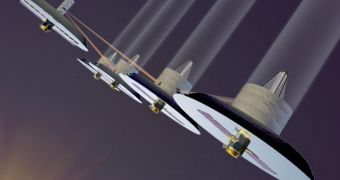Given the wealth of recent studies showing that it wouldn't be at all impossible for other planets to host forms of life, it stands to reason that the international scientific community has began wondering whether actually going out of our way to contact extraterrestrial civilizations is indeed the way to go.
For years, this has been the prevailing view, especially among organizations such as the Search for Extraterrestrial Intelligence (SETI) Institute, in California. Many messages have been sent to space via radio waves and gold discs aboard long-distance spacecraft.
But famed physicist Stephen Hawking, who is renowned for his work in particle physics theoretic physics, warned last year that alien civilizations may not necessarily be willing to cooperate with us.
The physicist gave the example of the culture clash that occurred when Europeans landed in North America. The native American population was shortly exterminated, save for some small groups.
The same could happen if we meet aliens, Hawking warned, except at a planetary scale. This would be especially true if we were to stumble upon a species like our own, acquisitive, ready to assert domination and resource-hungry,
According to a new study, it would appear that the only possibilities to consider when thinking about aliens is either that we are alone in the Universe, or that we may be accompanied by races such as ours.
Scientists say that this line of thought is derived from the fact that evolution, as a process, is predictable. Ultimately, animals evolving into intelligent being will need resources and the technology to extract it.
“At present, as many have observed, it is very quiet out there. And given many planetary systems are billions of years older than ours, I'd expect us to be best grilled on toast back in the Cambrian,” explains Simon Conway Morris, the author of the new study.
The expert is based at the University of Cambridge, Space reports. His main point is that any differences between us and aliens that developed under the guise of evolution would not exceed our appearance and culture.
All other aspects, intelligence, ability to understand, empathy, and so on will most likely be there as well, seeing how this is the natural way for a sociable species to evolve.
“If intelligent aliens exist, they will look just like us, and given our far-from-glorious history, this should give us pause for thought” the expert writes in the paper.
The work was published in the January 10 issue of the esteemed journal Philosophical Transactions of the Royal Society A.

 14 DAY TRIAL //
14 DAY TRIAL //